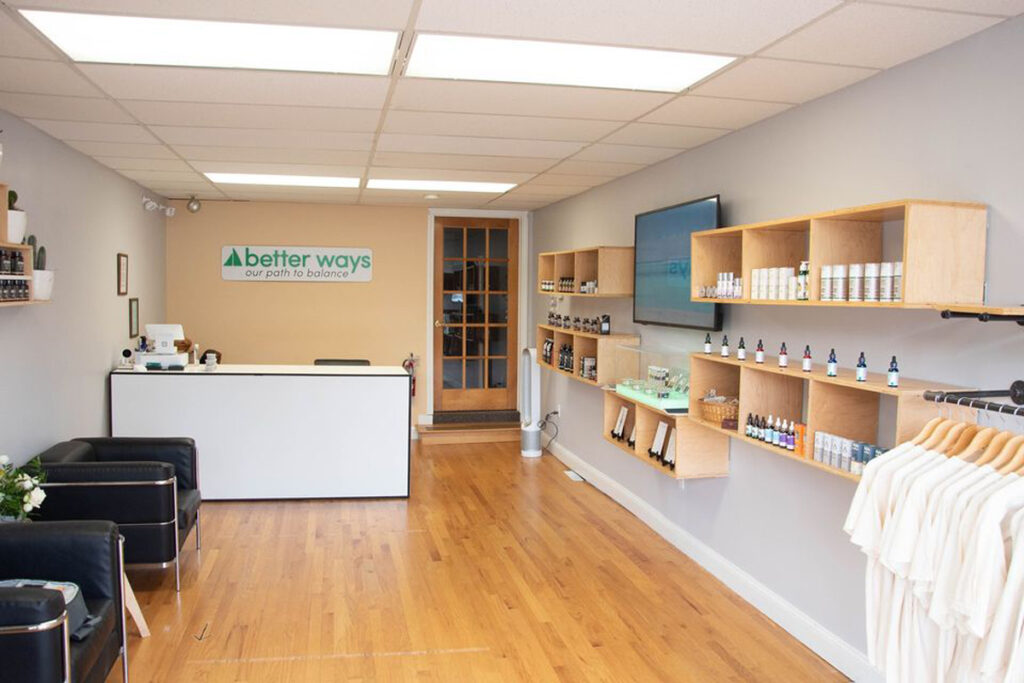Inside the Better Ways store in Branford, Connecticut. Credit: Courtesy of the Better Ways website / Better Ways, Branford, CT
A new Connecticut law restricting the sale of certain hemp products went into effect on Sunday, leaving an entire cottage industry in the lurch.
The new rules require cannabis operator licenses for shops that sell hemp-derived products. Numerous businesses that deal in hemp and synthetic THC products are already operating throughout the state, leaving them in danger of closure.
“We’ve gone and made it so that the 2018 Farm Bill doesn’t even apply in Connecticut. That’s affecting everyone across the board,” said Kristin Souza, owner of Sugar Leaf in Middletown, Connecticut, who also worried that local hemp farmers would be hurt if there were fewer options for them to sell their crops.
“I think the average person would want to help hemp farmers. They would want to help small businesses, but they just don’t realize this is happening,” she said. “I can’t imagine more than a couple of them will survive. Some folks are moving their businesses out of state so that they can continue to do online sales. I know a handful of folks that are just shutting down.”
The 2018 Farm Bill removed certain hemp products from the definition of “Marijuana” under the Controlled Substances Act. That means that hemp products that contain less than 0.3% THC are no longer illegal on the federal level. This has allowed shops across the country to sell products that are very similar and have similar effects as cannabis but are derived from legal hemp.
The growth of hemp-derived THC products has created a new option for consumers without the added costs that legal adult-use cannabis brings in terms of higher taxes and stricter regulations. Many states, such as Maryland, Missouri, and Arkansas, have attempted to pass state-level bans on certain hemp products in support of their own state’s legal cannabis markets.
Connecticut is the latest state to attempt to close this loophole, with a pair of bills that were signed into law last summer. HB 6699, which was an omnibus cannabis bill, included a provision that redefined high-THC hemp products as cannabis for the purposes of state licensing. HB 6700 then outlined those new regulatory restrictions on hemp products, which go into effect Oct. 1.
Aside from limiting the sale of hemp products, HB 6700 also allows hemp operators to apply for cannabis licenses, but that would also come with more regulatory hoops to jump through and added requirements such as using the state’s cannabis track-and-trace system. Basically, existing hemp companies can technically stay in business, assuming they are able to cover the added costs and regulatory burdens associated with the state’s adult-use cannabis market.
Ahead of that date, the Department of Consumer Protection sent out an email to hemp businesses alerting them to the new rules.
They include milligram limits for THC per serving, similar to how cannabis is regulated. The email noted that any reference to “THC” included Delta-7, Delta-8, Delta-9, Delta-10, THCA, and any other variations of tetrahydrocannabinol.
“Both High-THC Hemp Products and Synthetic Cannabinoids are now classified as cannabis under State law and may only be sold by licensed cannabis establishments,” said a letter sent out earlier this week by the Department of Consumer Protection. “If you do not hold a cannabis license issued by the Department of Consumer Protection (DCP), it is illegal to sell or offer cannabis, including synthetic cannabinoids, and high-THC hemp products. The sale of high-THC hemp products and synthetic cannabinoids at unauthorized retailers is unlawful and action may be taken by law enforcement.”
Under the new rules, hemp shop owners are pessimistic about the future of their businesses. Souza said that after Oct. 1, she was not sure if she would be able to keep her business open.
“I really don’t know what to do from here. I can’t just exist on candles and coffee mug sales,” she said.
Duncan Markovich, who owns Better Ways, a CBD and hemp shop in Branford, Connecticut, also said that his business would suffer under the new rules.
“You’re gonna make me tell my friend’s mom [who] I’ve been helping with cancer with federally legal products, ‘I can no longer help you.’ How is that ethical? How is that fair to anybody?” he asked. “I’m gonna have to take about 50 to 60 percent of my inventory off the shelves.”
H/T: ctnewsjunkie.com



